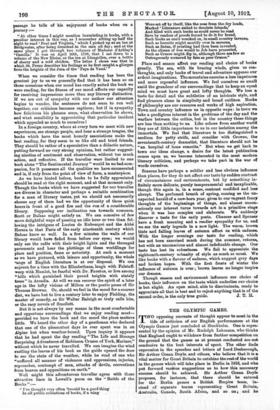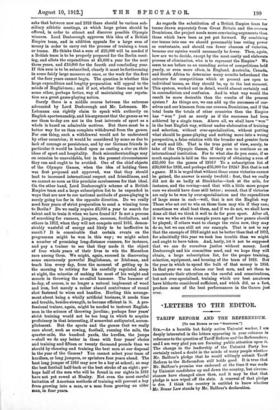THE OLYMPIC GAMES.
TWO opposing currents of thought appear to meet in the tide of criticism of our English performances at the Olympic Games just concluded at Stockholm. One is repre- sented by the opinion of Mr. Rudolph Lehmann, who thinks that England ought to withdraw from further competition on the ground that the games as at present conducted are not conducive to the best interests of sport. The other finds expression in the speeches and letters of Lord Desborough, Sir Arthur Conan Doyle, and others, who believe that it ie a vital matter for Great Britain to outshine the rest of the world in the games which will take place in Berlin in 1916, and who put forward various suggestions as to how this necessary success should be achieved. Sir Arthur Conan Doyle proposes, for instance, that there should be entered for the Berlin games a British Empire team, in- stead of separate teams representing Great Britain, Australia, Canada, South Africa, and so on ; and he
asks that between now and 1916 there should be various sub- sidiary athletic meetings, at which large prizes should be offered, in order to attract and discover possible Olympic winners. Lord Desborough approves this idea of a British Empire team, and in addition appeals for a large sum of money in order to carry out the process of training a team or teams. He thinks that a sum of £25,000 will be needed if a British team is to be properly prepared for the Berlin meet- ing, and allots the expenditure at £5,000 a year for the next three years, and £10,000 for the fourth and concluding year. If this sum is to be subscribed, clearly it must be forthcoming in some fairly large measure at once, or the work for the first of the four years cannot begin. The question is whether this large expenditure and lengthy preparation will appeal to the minds of Englishmen ; and if not, whether there may not be some other, perhaps better, way of maintaining our reputa- tion as a great game-playing nation.
Surely there is a middle course between the extremes advocated by Lord Desborough and Mr. Lehmann. Mr. Lehmann can rightly claim to speak with authority on English sportsmanship, and his argument that the games as we see them to-day are not in the best interests of sport as a whole is based on admirable motives. But there must be a better way for us than complete withdrawal from the games. For one thing, such a withdrawal would not be understood by other countries; it would be considered by some as due to lack of courage or persistence, and by our German friends in particular it would be looked upon as casting a slur on their ideas of sport and hospitality. Such misunderstandings may on occasion be unavoidable, but in the present circumstances they can and ought to be avoided. One of the chief objects of the Olympic Games, when the idea of holding them was first proposed and approved, was that they should lead. to increased international respect and friendliness, and we cannot so soon as this proclaim carelessness for that ideal. On the other hand, Lord Desborough's scheme of a British Empire team and a large subscription list to be expended in ways that are new to our national methods of game-playing is surely going too far in the opposite direction. Do we really need four years of strict preparation to send a winning team to Berlin P Do we really require £5,000 a year to search for talent and to train it when we have found it Is not a process of searching for runners, jumpers, oarsmen, footballers, and others in 1912, when they will not compete until 1916, demon- strably wasteful of energy and likely to be ineffective in result P It is conceivable that certain events on the programme might be won in this way ; we might select a number of promising long-distance runners, for instance, and pay a trainer to see that they made it the object of four whole years of their lives to win the Marathon race among them. We might, again, succeed in discovering some enormously powerful Englishman, or Irishman, and teach him every day, from the moment of getting up in the morning to retiring for his carefully regulated sleep at night, the minutia) of making the most of his weight and muscle in throwing the so-called hammer. The hammer of to-day, of course, is no longer a natural implement of wood and iron, but merely a rather absurd contrivance of round shot fastened to wires and handles. Hurling this arrange- ment about being a wholly artificial business, it needs time and trouble, besides strength, to become efficient in it. A pro- fessional trainer, again, might be needed to instruct English- men in the science of throwing javelins; perhaps four years' strict training would not be too long in which to acquire proficiency in that interesting, if somewhat antiquated, accom- plishment. But the sports and the games that we really care about, such as rowing, football, running the mile, the quarter-mile, the hundred yards, the hurdles, the jumps .—shall we do any better in these with four years' choice and training and fifteen or twenty thousand pounds than we should by choosing and training the best men at our disposal in the year of the Games P You cannot select your team of hurdlers, or long jumpers, or sprinters four years ahead. The best long jumper of 1916 may now be a boy at school; so may the best football half-back or the best stroke of an eight ; per- haps half of the men who will be found in our eights in 1916 have not yet rowed at Henley. Not even the most careful imitation of American methods of training will prevent a boy from growing into a man, or a man from growing an older man, in four years. As regards the substitution of a British Empire team for teams drawn separately from Great Britain and the oversee Dominions, the project needs more convincing arguments than those which have been as yet put forward. By combining our teams into one we should presumably lose voting power as contestants, and should run fewer chances of victories, because our entries would necessarily be fewer. Then, again, how are we to decide, except by the most costly and elaborate process of elimination, who is to represent the Empire P We seem to see before us an unending series of competitions held yearly, or even more often, in England, Australia, Canada, and South Africa to determine many months beforehand the entrants for competitions which at present are open to individual teams, as they should be, up to the last moment.
This system, worked out in detail, would almost certainly end in contradiction and confusion. And in what way would the result be more desirable than the results of the present system P As things are, we can add up the successes of our- selves and our kinsmen from our oversea Dominions, and if the total beats the totals of other countries then the Empire has "won" just as surely as if the successes had been achieved by a single team. Above all, we shall have " won " in the best English way, without undue elaboration of training and selection, without over-specialization, without putting what should be game-playing and nothing more into a wrong perspective, a false relation with the broader and greater facts of work and life. That is the true point of view, surely, to take of the Olympic Games, if they are to continue as an international institution. For to what else do you come, if so
much emphasis is laid on the necessity of obtaining a sum of £25,000 for the games of 1916 P To a subscription list of
£30,000 for 1920, and perhaps £35,000 for 1924? But that is not a game. If it is urged that without these sums victories cannot be gained, the answer is surely twofold : first, that we really did not do so badly at Stockholm—look at the mile, for instance, and the rowing—and that with a little more proper care we should have done still better; second, that if victories are only to be won by over-specialization and the expenditure of large sums in cash—well, that is not the English way Those who set out to win on those lines may win if they can; sometimes we shall beat them, and if we do not, we shall have done all that we think it well to do for pure sport. After all, it was we who set the example years ago of bow games should be played; if others want to change the rules now, they may do so, but we can still set our example. That is not to say that the example of 1916 might not be better than that of 1912, for admittedly this year we took less trouble than we might and ought to have taken. And, lastly, let it not be supposed that we can do ourselves justice without money. Lord Desborongh and his committee need, and we hope they will obtain, a large subscription list, for the proper training, selection, equipment, and housing of the team of 1916. But the year in which to spend the bulk of that money is 1916. In that year we can choose our best men, and set them to concentrate their attention on the careful and conscientious, but not over-specialized, training which our best amateurs have hitherto considered sufficient, and which did, as a fact, produce some of the best performances in the Games just over.



































 Previous page
Previous page